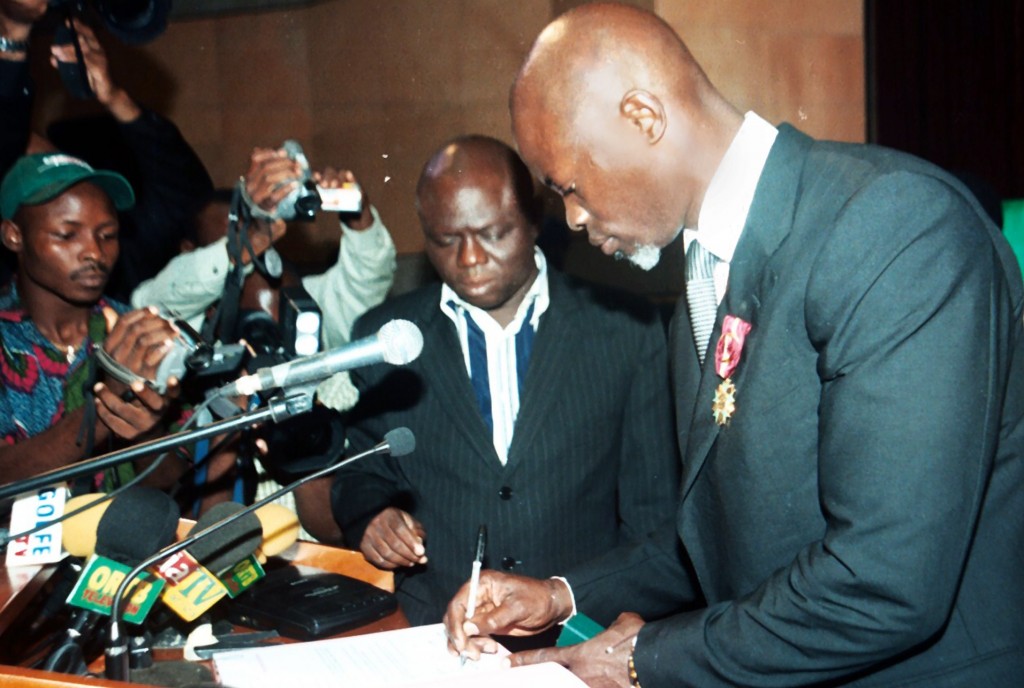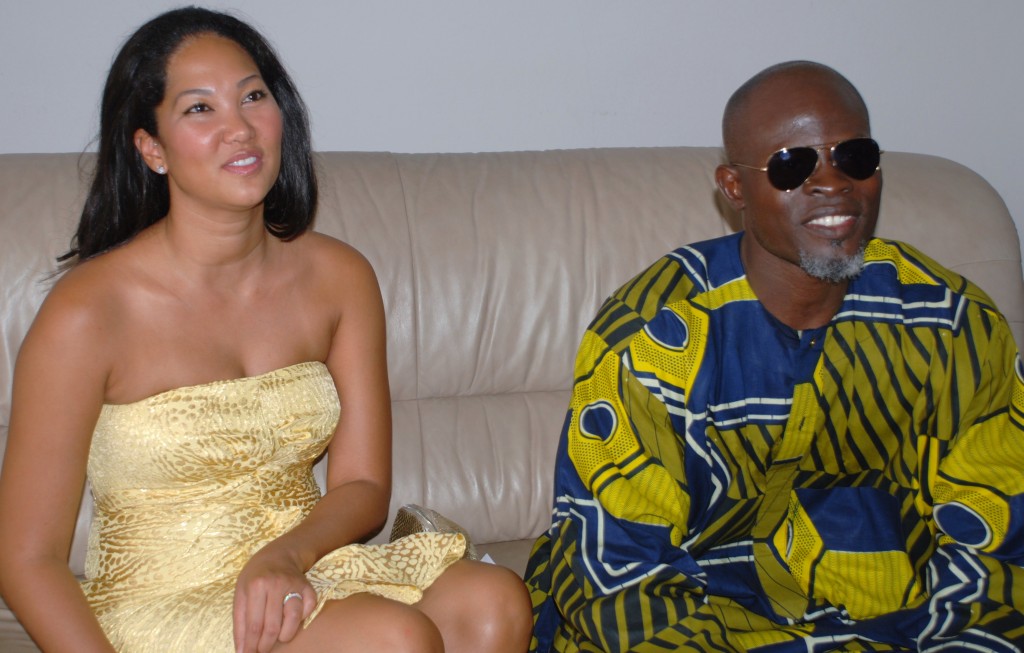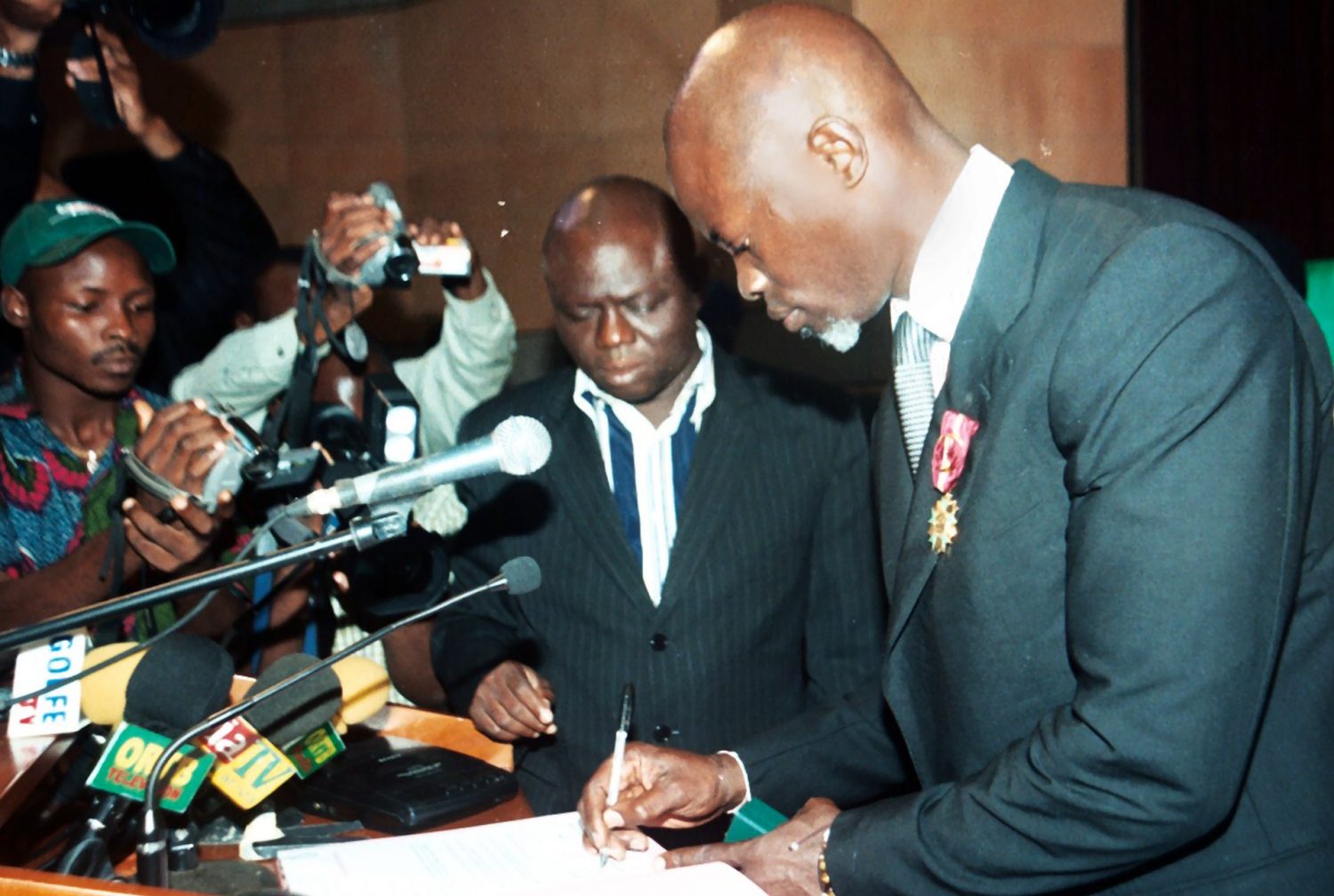Movie star Djimon Hounsou’s homecoming

BY LOU SIFA
Djimon Hounsou, the American movie star originally from Benin, West Africa who rose to fame thanks to his role in Steven Spielberg’s 1997 film Amistad, and later gained increased popularity with his critically-acclaimed performances in In America (a 2003 film directed by Jim Sherida), and in Edward Zwick’s 2006 movie, Blood Diamond, remembers his African roots. Talking about his role in Blood Diamond, a film in which he plays an African fisherman whose family was torn apart by the rebels from the civil war in his country, he said to journalist and syndicated film and book critic Kam Williams: “Being African, of course I feel a need and strong desire to be involved in films that deal with important issues impacting the continent. Also, I believe the movie industry has a responsibility to tell stories that mean something, that change our lives, and make us reflect on the way that we conduct ourselves and treat one another.”
Hounsou is only the fourth African male, after the late Basil Rathbone from South Africa who passed away in 1967; the late South Africa-born Cecil Kellaway who died in 1973, and Egypt-born Omar Sharif, now 78, to be nominated for the Academy Award. Hounsou has so far won more than a dozen awards including the 2007 NAACP Image Award for outstanding Supporting Actor in a Motion Picture for his performance in Black Diamond; the 1998 NAACP Image Award for Outstanding Lead Actor in a Motion Picture for, Amistad and the 2006 Sierra Award of the Las Vegas Film Critics Society for Best Supporting Actor, again for his role in Blood Diamond. He has been nominated for a dozen other prestigious awards.
Hounsou’s personal life story is like a script straight from Hollywood
Born on April 24, 1964, Hounsou, the youngest of five children, was sent to France by his parents at age 13 to live with his oldest brother in Lyon while attending school there. But the teenager refused to go to school and instead ran away to Paris and lived for several years literally on the streets, sleeping under bridges, begging for money and searching garbage cans for food. The now famous actor said he hates to talk about those days. However, in an interview that appeared in the December 3, 1997 issue of The Daily News, he reportedly said: “School bored me. Being educated and being intelligent are two different things. I thought I was smart enough. And I wanted to be an entertainer. I stopped going to school as a way of saying I was mature, a way of saying I was going to choose who I was going to become.”
Life smiled at the homeless young man when French fashion designer Thierry Muglar, who had seen photos of Hounsou, seized the opportunity to fulfill his desire of using a totally unknown model to wear his new line of clothing. A wide avenue thus opened for Hounsou who soon became a top model who traveled all over the world. That was until he was invited by Madonna, who saw him modeling in Los Angeles in 1989, to be in her Express Yourself video. That was a turning point in Hounsou’s life.
“Being educated and being intelligent are two different things,” we remember Hounsou saying in the 1997 Daily News interview. But eight years earlier, the then-top model and movie-star-to-be (who lacked formal education) had demonstrated the power of intelligence and its close connection to education by starting to learn English, although he did not need English skills for an upcoming shoot. (He mentioned his lack of English language skills prior to his arrival to the United States among the major obstacles he has faced in his life, saying in an interview with reporter Kam Williams: “My coming to America, moving here all by myself, just me, myself and I, with no background in the language and having to learn it on the spot in order to work in English.”) So he simply knew it would help to master the English language if he wanted to move on to films and television work. The Learning Channel, A&E and The Discovery Channel thus became our future movie star’s tutors.
After a string of music video jobs, Hounsou got his first television role as a nightclub doorman on the television series Beverly Hills 90210 in 1990. Then followed a few minor roles in small-budget movies, until he was approached in 1996 by movie director Steven Spielberg who wanted him to audition for his new film, Amistad, which is based on the true story of a slave mutiny that took place aboard a ship of the same name in 1839 and the legal battle that followed. Hounsou won the role of Joseph Cinqué, the leader of the slave revolt. Amistad hit the big screen in December 1997 and scored a big success. Hounsou’s great performance earned him a Golden Globe nomination. Bonjour success.
Hounsou landed a recurring role on the hit TV series E.R. in 1999. His next major role in a feature film came when he played Juba in Gladiator in 2000. He landed a supporting role in the French film Le Boulet in 2002. Several other acting opportunities knocked at his door, and his career heated up with his 2004 Academy Award nomination for his role in In America, a 2003 film directed by Jim Sheridan in which Hounsou played a man with AIDS who is befriended by two young girls. The movie focuses on an immigrant Irish family’s efforts to survive in New York City, as seen through the eyes of the elder daughter.
Hounsou’s second Academy Award nomination came two years later for his role in Blood Diamond. In this movie he co-starred with the critically-acclaimed Leonardo DiCaprio who had reached superstardom by playing Jack Dawson in Tit (1997), the highest grossing film ever, tied with Ben-Hur (1959) for most Academy Awards. While DiCaprio did win the Oscar of Best Actor for Blood Diamond (Hounsou’s nomination for the Oscar of Best Supporting Role remained just that, though he won several less prestigious awards for that same movie), Hounsou was largely praised for making the audience feel the gamut of emotions his character experiences during the film. One New York critic wrote that he “beautifully rises above the somewhat limiting way his role was written.”

Hounsou has since engaged in other acting activities and even won recognition outside the realm of acting. Yes, in December 2007 he was named “The Most Beautiful Black Man Alive” by TV One Access. The ebony-complexioned, 6’3″-tall Hounsou topped a list that also included Denzel Washington, Shemar Moore and Will Smith. The African has learned that the men who win this honor are not only those most appealing to ladies, but also those who have proven themselves to be exemplary in their everyday life off the screen. “It certainly wasn’t easy selecting this handful of men out of the millions of beautiful brothers out there, but someone had to do it,” said Monique Chenault, Senior Producer for TVOne Access. “Our countdown wonderfully reflects all the beautiful shades that the sexiest black men represent.”
Hounsou is not beautiful only in the eyes of African American sisters. He is also highly popular in Benin, his country of origin where he received a hero’s welcome in August 2008. The movie star, who made the trip back home with his then-girl friend Kimora Lee Simmons and the latter’s two daughters, Ming Lee and Aoki Lee, received several medals of honor, including Chevalier de l’Ordre National du Mérite and Citizen of Honor of Porto-Novo (Benin’s capital) and of Cotonou (the largest city).
Despite fast climbing the ladder of success, Hounsou has not forgotten his African roots. In fact he is growing into an African advocate on the world’s stage.
At the U.N. conference on climate change held in Stockholm in October 2009, African nations, which contribute to less than four per cent of worldwide carbon dioxide emissions and yet are already starting to feel the effects of global warming, expressed their desire to see rich nations cut emission to at least 40 percent below the 1990 levels by 2020, and deeper cuts by the West to reach at least 80 percent below 1990 levels by 2050. Speaking in the Swedish capital a week before the conference, Djimon Hounsou drove home that point, hammering that developed nations “need to be held accountable.” Climate change will “force people to move off their land, potentially provoke conflict, and cause economic and political instability,” the actor said.
When asked by reporter Kam Williams in an interview posted on the web on January 30, 2009: “Is there a question no one ever asks you that you wish someone would?” Hounsou said: “Yes, but how do I put this? It really has to do with the way people view Africa, when Africa is addressed. I think the generic way of looking at Africa is like it’s just a bunch of people in loincloths running around chasing gazelles and stuff. That’s the issue, but I don’t exactly know how to phrase that as a question.”
Our rising star, who is all-too aware that he has higher to rise on the ladder of success, vowed in yet another interview: “We have Africans and African-Americans, contemporary men with great stories, great integrity, great heroes and nobody wants to see or hear about those African heroes and those African American heroes. One day, I will be in a position to play those great human beings on-screen.”
Hounsou’s amazing journey from zero to hero is tangible proof that he has the potential to grow big enough to be entrusted one day with the large role of playing a great African or African American hero. He was, indeed, the lad who survived the hardships of street life in Paris until he was recognized by French designer Thierry Muglar; the newcomer who came to America with no English skills and happened to be his own tutor, and later won two Oscar nominations.
Cinqué, the West African farmer, young husband and father in the movie Amistad who, after being kidnapped by slave-hunters and put on a U.S.-bound boat, broke his shackles and led a devastating rebellion, clearly has the same fighting and winning spirits as the very man who played him on the big screen—Djimon Hounsou.


